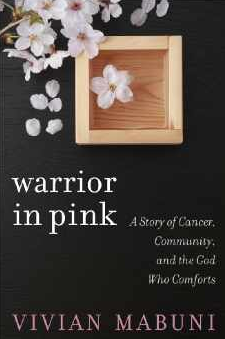Imagine a group of ten women friends. Based on the current statistics from the National Cancer Institute, at least one of them will battle breast cancer. And according to the National Cancer Society, “Nearly half of all men and a little more than one-third of all women in the United States will have [some form of ] cancer during their lifetimes.” These are sobering statistics. Every year when it’s time to have my mammogram, my heart beats faster, my stress level rises. I probably shouldn’t do this but I always watch the radiologist’s eyes as she reviews the scan. Cancer is a terrifying disease, even when it’s caught early.
Author Vivian Mabuni became one of the women who received that dreaded diagnosis of breast cancer. Her “routine” mammogram turned out to be anything but routine. As she waited with sweaty palms and flimsy gown wrapped around her torso, she grabbed her Bible and opened it to her daily reading, Psalm 66: “We went through fire and through water, yet You brought us out into a place of abundance.”
In the first chapter of Warrior in Pink: A Story of Cancer, Community, and the God Who Comforts, she writes:
“God impressed on my heart that He meant this verse for me—as if he laid out for me what loomed ahead—a testing through fire and water. And a promise that He would bring us out of the testing to a new place. A place of abundance.”
I don’t like thinking about cancer, yet alone reading about it. But in the past two years, my mother-in-law died from pancreatic cancer, three family members are currently fighting the disease, one close friend recently had a mastectomy, and another friend is in an isolation unit for the next four weeks after stem cell transplants. In this season of my life, ignoring cancer is no longer possible.
In Vivian’s case, she not only battled cancer but the cultural barriers regarding asking for help that are part of her Asian heritage. She had been taught not to “rock the boat” and that “the nail that sticks out get hammered down” and these lessons “amplified [her] struggle of not wanting to bother people with [her] problems.” Somehow, she had the wisdom and courage to understand that she needed to make a different decision: a decision to invite others into her pain and need. She explains,
“Transparency is the willingness to share about difficulties one has undergone after the face. Vulnerability is sharing difficulties raw, in real-time, without the lesson-learned end of the story. I was comfortable with transparency. Mostly Vulnerability? Not so much.”
Thankfully, Mabuni presses through her reluctance to be vulnerable and invites a community of friends to stand with her. Part of the beauty of this book is that she also allows us to witness her choices and walk with her in this incredibly frightening season. She does not spare us the devastation of cancer. She does not tie a sparkly bow with crosses on her story, pretending that due to her faith, she had no pain or struggle. For how could anyone not have doubts or questions amidst scans, chemo, surgery, and the loss of body parts that often accompanies cancer?
As the subtitle suggests, Vivian made it through her trials with the support of her community, her God who comforts, and a bit of tenacity. She understood early on that she needed to be a warrior, an ezer* if she hoped to win the battle. Warrior in Pink will make you cry (repeatedly, esp. chapter eight), will help you to understand what it’s like to be on the front lines of the cancer battle, and also fill you with hope and admiration. Not just for Vivian, but for all the men and women in your life who have faced cancer. At the end of the book, it’s obvious that Mabuni has entered into the land of abundance that God promised. She has grown stronger, more mature, and more loving. By reading her book, I think I have too.
Warrior in Pink is published by Discovery House and is available through Amazon.
To read more from Vivian, visit her beautiful site: http://vivianmabuni.com/
*Ezer is the Hebrew word used to describe Eve. Found 21 times in the Old Testament, the word is most often used in the context of fighting military battles.
